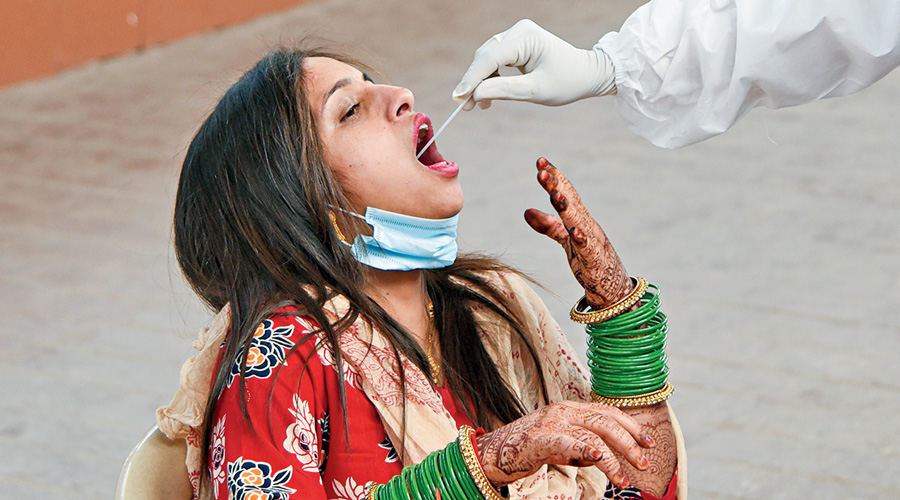The Bengal government has decided to upgrade its infrastructure to a point where five lakh people can be administered the Covid-19 vaccine every day in a bid to counter the rising number of positive cases in the state, once the required number of vaccine vials are made available by the Centre.
“Right now, we have the capacity of administering more than three lakh vaccines a day,” said a senior state government official. “But we want to ready our capabilities to administer five lakh vaccines a day so that we can give more vaccines to all eligible people as soon as we get the required number of Covid-19 vaccines from Delhi. This will help us tackle the virus that is spreading once again in the state.”
The number of Covid-19 positive cases has again started rising in the state in the past few weeks. The state government has started preparing the groundwork to tackle the situation amid the poll season to ensure that the situation does not spiral out of control.
In the third week of March, a total of 2,400-odd Covid-19 positive cases were reported in the state. But the figure jumped to 4,400-odd in the fourth week of March.
In October 2020, when the pandemic was at its peak in the state, the state had over 37,000 active cases.
The number of active cases is rising again. It reached 5,000 from 900 within two weeks. The situation may turn critical as large gatherings are seen in political rallies during the ongoing poll season where Covid-19 safety protocols are hardly followed, said sources.
Though most positive cases are found mainly in Calcutta, North 24-Parganas and areas surrounding Asansol in West Burdwan these days, officials fear the fresh wave might hit other districts too with political rallies in districts and leaders and political workers travelling to different districts from Calcutta and its adjoining areas.
Along with preventive measures to contain the spread of the infection, the state government is putting stress on vaccination. The more people are vaccinated, the more efficiently can the spread of the infection be arrested, officials said.
“So far, 50 lakh doses of vaccines have been administered. Six lakh people have got both the doses of vaccines. We want to reach out to three crore frontline workers, the aged people and people with comorbidities within a short period. Nowadays, we are giving vaccines to some 2.5 lakh people a day and that’s why we are readying infrastructure to give 5 lakh vaccinations a day,” said a source.
Covid beds
The state government has also once again started restoring Covid-19 hospital beds in government hospitals and in private hospitals that had been requisitioned by the government.
“About 20 to 30 per cent of the 12,000-odd beds in these hospitals had been released as the number of Covid patients had gone down (earlier this year). But gradually, these beds are being brought back to treat Covid patients,” said another official.
The health department also held a meeting with the private hospitals to restore their Covid-19 beds in Calcutta and its surroundings as the number of cases are rising in the city and its outskirts.
“During the peak in October last year, we had 3,000 Covid-19 beds in private hospitals. The number went down to 900 but again slowly the beds are being brought back to treat Covid-19 patients,” said a source.
Though the requirement for hospitalisation is comparatively less in this phase, the health department is not ready to take any chance.
“Out of the 5,000 positive cases, only some 800 are in hospitals. Of them, 10 per cent needed ICU support. But we have to keep infrastructure ready to deal with more cases in the hospitals, if the need arises,” said a source.
More tests
The health department is also working to increase the number of daily tests to arrest the spread of the virus. This time, the department has upgraded its laboratory facilities to conduct more RT-PCR tests compared to the rapid tests.
“During the peak of the pandemic, we had conducted 42,000-odd tests a day and we are gradually increasing the number of tests again,” said a health official. “A total of 17,869 tests were done on Tuesday. The number of tests will be increased and now 70 per cent of the tests would be RT-PCR tests, which was less than 50 per cent last year.”











